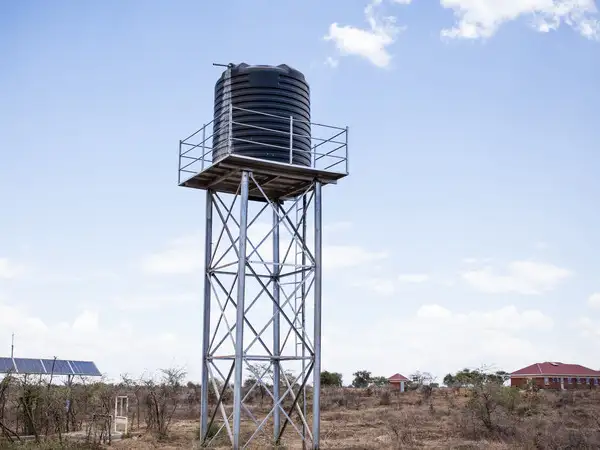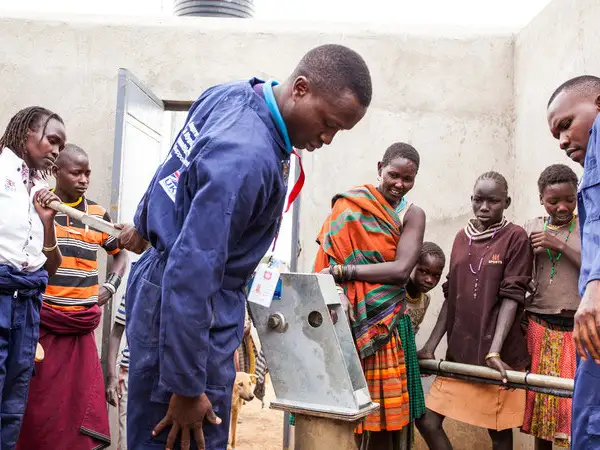

A water tank in the region of Karamoja, in north-eastern Uganda.
Mark Kipkirui Baiywoh, CAFOD’s lead water engineer in Kenya, and Daniel Lowalem, who works for Caritas Moroto in Uganda, have been working in one of the driest parts of Uganda.
With the UK Government’s aid match funding, Mark, Daniel and their teams have helped over 70,000 people to get access to clean, safe water and toilets.
Here are seven things we've learned about water in Karamoja from Mark and Daniel:
1. Toilets change people’s lives
Many communities didn’t have clean, safe toilets because they had traditionally practiced open defecation, which means going to toilet in the bush.
Having a toilet in a home restores dignity, especially for women and girls, reduces illness and ensures the safety of the water in the ground.
People who don’t have a toilet in the home and aren’t able bodied really struggle. One community member who was living with a disability opened up to Daniel about how difficult life was for him without a toilet in his home, especially in the rainy season and in the night.
Meet the nun who builds terrific toilets
2. Extreme and unpredictable weather is devastating communities
Mark is very clear about how climate change is affecting people not only in Karamoja, but in parts of Kenya too.
Even amongst the vast wealth and affluence of Nairobi, there is still water rationing that he experiences himself.
3. Installing a water pump takes time
A water survey has to be done by hydro experts. Once an underground source has been identified, work can take place to discuss the water source with the community. There may be resistance to the pump because it might be seen as unsafe, or untrusted.
If a community agrees to a water pump being built near them, the drilling equipment needs to be readied. Mark told listeners that this can take anything from a day to a week.
When the equipment arrives, it can take a day or two to drill a water source which normally ranges between 60-100 metres deep.
From the time of the survey to the water coming out of the pump can take weeks or months.


Caritas Moroto installs and mends water pumps in Karamoja, Uganda – a region that suffers from extreme drought.
4. Involving community members is the key to success
A community has to be happy to have a water source near them. Many meetings have to happen to sensitise communities. Daniel and his team work to understand the community’s needs, hopes and reservations.
If a community agrees, some are trained to help repair the pump if it breaks down. Women and men are involved in this training.
5. Skills sharing between communities makes a huge difference and gives people a sense of ownership
Some of the real successes have been when communities share skills with other communities – especially with toilets. Part of the reason for many communities in Karamoja building toilets is peer-to-peer discussion and learning through seeing.
6. Women and girls are vital in all of this work
Mark explains there is a lot of work with communities to ensure girls and women are consulted. Some schools are running hygiene classes where girls and boys learn about hygiene together.
One of the important classes is on menstruation. Girls and boys learn together about menstrual periods and make pads for girls out of reusable materials. The entire project has helped to keep girls in school because they don’t have to worry about bullying from the boys, or not having a pad with them.
How we are fighting period stigma in Uganda
7. The culture of Karamoja is rich and diverse
Daniel is from Karamoja and understands the people and area. He knows how rich and diverse the history and culture is. The people are related to the Turkana, Maasai and Samburu in Kenya, and can trace their roots to Nyangatom and other tribes in Omo river in Ethiopia.
There are many traditions that the communities have that differentiate them. Some of the work Daniel and his team do is to work to preserve the traditions, while supporting communities to move away from harmful practices such as female genital mutilation and domestic violence.

